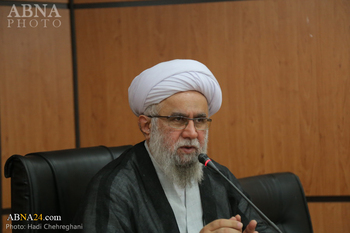Mirza Kuchak Khan aware of affairs of his time, had a religious understanding and concern: Ayatollah Ramazani
Describing Mirza Kuchak Khan to have a jihadist spirit, the Secretary-General of the AhlulBayt (a.s.) World Assembly, stated “He maintained this spirit until his death and resisted the foreigners. Mirza Kuchak Khan pursued the ideal of an Islamic state and rejected nationalist sentiment and thinking.”
A one-day pre-conference entitled “A Study of the Anti-Arrogance Positions of the Clergy and the Islamic Resistance in the Movement of Mirza Kuchak Khan Jangali” was held on Thursday, December 16, 2021, 08:00 a.m. in the hall of the Dar al-Walaya Complex in Qom.
In this ceremony, on the personality of Mirza Kuchak Khan, Secretary-General of the AhlulBayt (a.s.) World Assembly stated, “This character was a nobleman of resistance, and had many characteristics, including religious understanding and concern.”
“Mirza Kuchak Khan began seminary courses at the age of 17, which lasted 23 years. He established the Islamic Union, in which Muslim mujtahids were present. At one time, there were 30 indisputable mujtahids in Gilan province, each of whom played a role,” Ayatollah Reza Ramazani continued.
Mirza Kuchak Khan had religious understanding and concern
“He was a virtuous cleric, who was aware of the affairs of his time, had a religious understanding and concern, and Islam was very important to him. He had political insight, and this insight is very important for a religious scholar,” he added.
Describing Mirza Kuchak Khan to have a jihadist spirit, the Secretary-General of the AhlulBayt (a.s.) World Assembly, stated “He maintained this spirit until his death and resisted the foreigners. Mirza Kuchak Khan pursued the ideal of an Islamic state and rejected nationalist sentiment and thinking.”
“Unfortunately, we see some incorrect historiographies about Mirza Kuchak Khan Jangali, and some interpretations have been used about him which have caused improper judgments about him,” he added.
“In one of his books, Professor Christine says that Mirza is not only a hero in history, but also a role model, and played an important role in his time,” Ayatollah Ramazani added.
Religious scholars must be active in the Resistance arena
“Islamic jurisprudence has dealt not only with individual issues but also with social issues and has even dealt with some social rules much more than individual rules,” he said, referring to the importance of Islamic jurisprudence.
“In order for Islam to be realized in society, we must have a maximum view of Islam and not a minimum view. Religion must appear in the social and political arenas. Those who are familiar with Islamic literature do not understand the avoidance of politics, but the real politicians are the divine people,” continued the professor of the higher levels of the seminary of Qom.
“Religious scholars must be active in the resistance arena as role models for human society. There are many Quranic verses about resistance and jihad. So that 400 verses of the Quran are about jihad and resistance. Unfortunately, we see some people saying that these verses should be abandoned. However, if we look at the philosophy of resistance from the perspective of Islam, we see that there is no talk of domination and expansion. Rather, the Resistance Front has been created for the realization of the divine word, the realization of the monotheistic system, and the confrontation against authoritarianism, coercion, and hypocrisy,” he added.
With the abandonment of the resistance, Muslims began to decline in various areas
“Those who ridicule the Resistance Front did not understand the basic literature of Islam. If resistance and the theory of resistance were properly defined in society, Muslims would never be oppressed, and they would always be at the top,” said the Secretary-General of the AhlulBayt (a.s.) World Assembly, considering the resistance to have a rational reason.
“In every Islamic country where there was resistance, there was more dignity and pride for Muslims. But with the abandonment of resistance, Muslims began to decline in various fields. Imam Khomeini (r.a.) emphasized that Islam has a governance program, and the effectiveness of this program in the era of modernity is achievable,” he continued.
Seminaries must study the various dimensions of resistance
“From the beginning of the Islamic Revolution, Imam Khomeini emphasized resistance. Seminaries must study the various dimensions of resistance from a jurisprudential point of view,” added the professor of higher levels of the seminary of Qom.
Considering Gilan as a cultural province, he stated, “Unfortunately, this province has not achieved the necessary infrastructure during the last four decades. In a meeting with the intellectuals of Gilan, the Supreme Leader of the Revolution said that Gilan is one of the privileged provinces of the country.”
The axes of Mirza Kuchak Khan’s uprising should be highlighted historically
“The people of Gilan have always tried to fight oppression. The axes of Mirza Kuchak Khan’s uprising should be highlighted historically. He started his uprising with the least facilities and stood against oppression,” continued the representative of Gilan province in the Assembly of Experts.
“Mirza resisted the oppressors who sought to humiliate and make Iran dependent. He was a popular figure who had an Islamic movement. Mirza sought to establish an Islamic state, and was not a separatist,” he added.
“The deception of some of Mirza’s companions, the negligence of some elites, the infiltration of some enemy agents into the Jungle Movement, were among the factors that defeated Mirza’s movement. He was always threatened and was a deserted character,” said Ayatollah Ramazani, on the factors of his failure, emphasizing the importance of reading Mirza Kuchak Khan’s letters.
“An outstanding conference should be held to commemorate Mirza Kuchak Khan. He is one of the role models for Resistance and more studies should be done about him,” he continued.
Describing Mirza Kuchak Khan to have a jihadist spirit, the Secretary-General of the AhlulBayt (a.s.) World Assembly, stated “He maintained this spirit until his death and resisted the foreigners. Mirza Kuchak Khan pursued the ideal of an Islamic state and rejected nationalist sentiment and thinking.”
A one-day pre-conference entitled “A Study of the Anti-Arrogance Positions of the Clergy and the Islamic Resistance in the Movement of Mirza Kuchak Khan Jangali” was held on Thursday, December 16, 2021, 08:00 a.m. in the hall of the Dar al-Walaya Complex in Qom.
In this ceremony, on the personality of Mirza Kuchak Khan, Secretary-General of the AhlulBayt (a.s.) World Assembly stated, “This character was a nobleman of resistance, and had many characteristics, including religious understanding and concern.”
“Mirza Kuchak Khan began seminary courses at the age of 17, which lasted 23 years. He established the Islamic Union, in which Muslim mujtahids were present. At one time, there were 30 indisputable mujtahids in Gilan province, each of whom played a role,” Ayatollah Reza Ramazani continued.
Mirza Kuchak Khan had religious understanding and concern
“He was a virtuous cleric, who was aware of the affairs of his time, had a religious understanding and concern, and Islam was very important to him. He had political insight, and this insight is very important for a religious scholar,” he added.
Describing Mirza Kuchak Khan to have a jihadist spirit, the Secretary-General of the AhlulBayt (a.s.) World Assembly, stated “He maintained this spirit until his death and resisted the foreigners. Mirza Kuchak Khan pursued the ideal of an Islamic state and rejected nationalist sentiment and thinking.”
“Unfortunately, we see some incorrect historiographies about Mirza Kuchak Khan Jangali, and some interpretations have been used about him which have caused improper judgments about him,” he added.
“In one of his books, Professor Christine says that Mirza is not only a hero in history, but also a role model, and played an important role in his time,” Ayatollah Ramazani added.
Religious scholars must be active in the Resistance arena
“Islamic jurisprudence has dealt not only with individual issues but also with social issues and has even dealt with some social rules much more than individual rules,” he said, referring to the importance of Islamic jurisprudence.
“In order for Islam to be realized in society, we must have a maximum view of Islam and not a minimum view. Religion must appear in the social and political arenas. Those who are familiar with Islamic literature do not understand the avoidance of politics, but the real politicians are the divine people,” continued the professor of the higher levels of the seminary of Qom.
“Religious scholars must be active in the resistance arena as role models for human society. There are many Quranic verses about resistance and jihad. So that 400 verses of the Quran are about jihad and resistance. Unfortunately, we see some people saying that these verses should be abandoned. However, if we look at the philosophy of resistance from the perspective of Islam, we see that there is no talk of domination and expansion. Rather, the Resistance Front has been created for the realization of the divine word, the realization of the monotheistic system, and the confrontation against authoritarianism, coercion, and hypocrisy,” he added.
With the abandonment of the resistance, Muslims began to decline in various areas
“Those who ridicule the Resistance Front did not understand the basic literature of Islam. If resistance and the theory of resistance were properly defined in society, Muslims would never be oppressed, and they would always be at the top,” said the Secretary-General of the AhlulBayt (a.s.) World Assembly, considering the resistance to have a rational reason.
“In every Islamic country where there was resistance, there was more dignity and pride for Muslims. But with the abandonment of resistance, Muslims began to decline in various fields. Imam Khomeini (r.a.) emphasized that Islam has a governance program, and the effectiveness of this program in the era of modernity is achievable,” he continued.
Seminaries must study the various dimensions of resistance
“From the beginning of the Islamic Revolution, Imam Khomeini emphasized resistance. Seminaries must study the various dimensions of resistance from a jurisprudential point of view,” added the professor of higher levels of the seminary of Qom.
Considering Gilan as a cultural province, he stated, “Unfortunately, this province has not achieved the necessary infrastructure during the last four decades. In a meeting with the intellectuals of Gilan, the Supreme Leader of the Revolution said that Gilan is one of the privileged provinces of the country.”
The axes of Mirza Kuchak Khan’s uprising should be highlighted historically
“The people of Gilan have always tried to fight oppression. The axes of Mirza Kuchak Khan’s uprising should be highlighted historically. He started his uprising with the least facilities and stood against oppression,” continued the representative of Gilan province in the Assembly of Experts.
“Mirza resisted the oppressors who sought to humiliate and make Iran dependent. He was a popular figure who had an Islamic movement. Mirza sought to establish an Islamic state, and was not a separatist,” he added.
“The deception of some of Mirza’s companions, the negligence of some elites, the infiltration of some enemy agents into the Jungle Movement, were among the factors that defeated Mirza’s movement. He was always threatened and was a deserted character,” said Ayatollah Ramazani, on the factors of his failure, emphasizing the importance of reading Mirza Kuchak Khan’s letters.
“An outstanding conference should be held to commemorate Mirza Kuchak Khan. He is one of the role models for Resistance and more studies should be done about him,” he continued.






